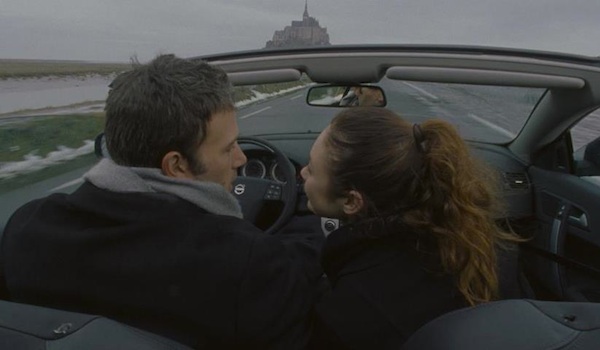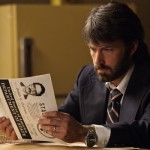To the Wonder Review
Posted on April 14, 2013 By John Gilpatrick 2013, Movie Reviews, New Releases
If you like your films full of feeling, To the Wonder is for you. The latest from enigmatic director Terrence Malick sacrifices story, character, and dialogue to give the world a film full of and about feelings. The feelings in To the Wonder walk, talk, and interact with other feelings. They have names and faces. And like characters do in most Malick movies, the feelings here love twirling in fields of tall grass. If Malick didn’t intend for us to take To the Wonder deathly seriously, one might not be incorrect in assuming his latest is a self-aware farce—a film so extremely “Malickian” that you could close either your eyes or ears for the entire two hours and not doubt for one second the identity of the director. To the Wonder is beautiful, and to be fair, it has its moments, but they drown in a sea of inertia.
The film is merely a series of narrated vignettes meant to tell us about a relationship between Marina (Olga Kurylenko) and Neil (Ben Affleck). She’s a Parisian. He’s from Oklahoma. After spending some glorious time together during his vacation in Europe, she and her 10-year-old daughter pack their bags and move to the States. Once there, the spark between Marina and Neil dims. She’s forced to return home after her Visa expires (Neil isn’t interested in marriage), and while she’s gone, he rekindles a long-dormant relationship with a woman he knew in his childhood (Rachel McAdams). But some time later, Marina is ready to return, and Neil is forced to make a choice, to admit what he wants.
The film starts out strongly only to peter out in its second half. There’s something comforting about the opening minutes of a Malick movie—seeing the camera move, hearing the swelling music and the first whispered breath of spoken words. These are conventions that fans of the director adore, and when Olga Kurylenko (who’s luminous) and Ben Affleck (who’s less so) begin traipsing across a shallow pool of muddy ocean water, To the Wonder feels right.
When we transition (quite early) to Oklahoma—to the tall wheat fields, buffaloes, and blazing sunsets—To the Wonder still feels right. When Marina and Neil’s relationship feels its first strains and she’s replaced by an equally luminous Rachel McAdams, To the Wonder still feels right. In fact, the Rachel McAdams portion of the film might be To the Wonder‘s strongest material (it would have made a sensational short film, I suspect).
When Marina returns and Neil makes his choice, To the Wonder no longer feels right. You’ll soon realize Malick has been building to a moment he brushes past as nonchalantly as his walking, talking feelings—not characters—brush past each other. (Incidentally, the nonchalant brush past is a favorite move of these walking, talking feelings—second only, perhaps, to the twirl.)
To the Wonder, it should be pointed out, features an incredibly traditional five-act structure, and what’s even worse than the way he depicts the emotional climax is what happens on the way down. Acts four and five are shells of a Malick act. Nothing is driving the film forward at this point. We’re merely on the hook, waiting for it to end. And he keeps going. And Olga keeps twirling. And you quickly realize this guy has no concept of what human beings really do or think or act. It all looks and sounds beautiful (thank you Emmanuel Lubezki and Hanan Townshend), but it’s in service of absolutely nothing.
Kurylenko probably comes away from To the Wonder looking the best. Malick brings something out of her no other filmmaker has proven able to up to now. We spend more time with Marina than everyone else in the film combined. And while she’s all over the place as an individual, at least we’re given enough time to discern something about what makes her tick.
Affleck, in front of the camera for the first time since Argo, proves unable to transcend the screenplay’s shortcomings. His Neil is never fleshed out, and by the end of the film, we’re left wondering why any woman would be drawn to him so completely and whole-heartedly.
There’s a subplot featuring Javier Bardem as a doubting priest that’s so shoehorned into To the Wonder so awfully that it makes the Sean Penn material in The Tree of Life feel thrilling and essential. It’s easy to see what Malick is doing; If To the Wonder is about love and mankind’s inability to understand it, Bardem’s character is meant to demonstrate that love is a broader idea than human to human connection. While a worthy point to make, the execution is all wrong. There’s probably a lot of Bardem on the cutting room floor. Perhaps Malick should have kept cutting.
If this film is secretly autobiographical, like some are claiming, its opaqueness makes more sense, and in that respect, it’d make for an interesting discussion about the success or failure of its sort of meta storytelling method. Taken completely out of context, however, and judging it solely on what’s on the screen, To the Wonder is, at best, a mixed bag. It’s heartbreakingly beautiful, but utterly melancholy, and it never does anything to earn such a downbeat tone. Throw in the awkward Javier Bardem material, and you’ve got all the ingredients you need for a well-intentioned misfire.
2.5 Stars, 2013, A.J. Edwards, Ben Affleck, Christopher Roldan, Emmanuel Lubezki, Hanan Townshend, Jack Fisk, Javier Bardem, Keith Fraase, Mark Yoshikawa, Olga Kurylenko, Rachel McAdams, Shane Hazen, Terrence Malick, The Tree of Life, To the Wonder, VOD

















